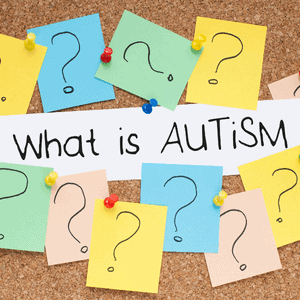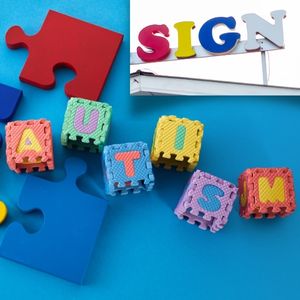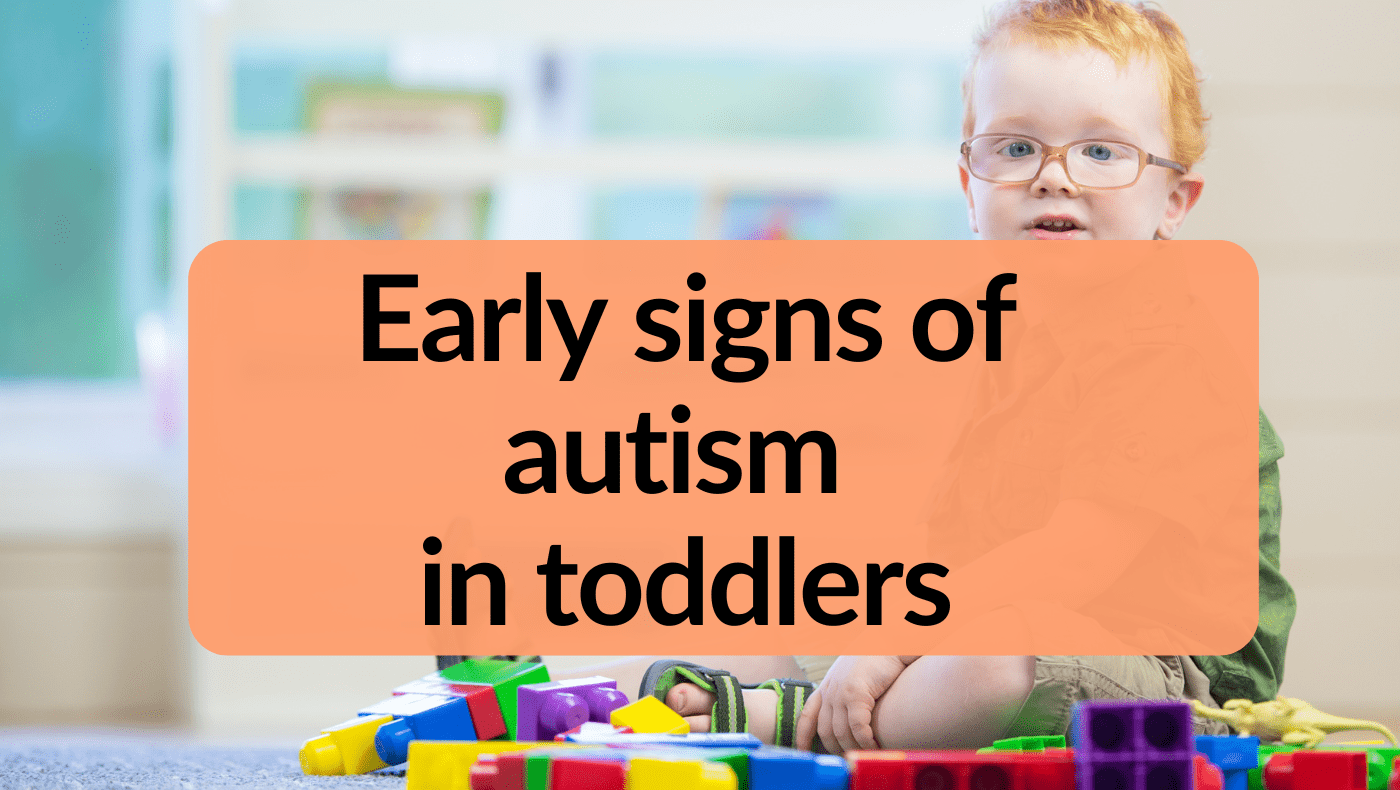Last updated on May 14th, 2024 at 03:17 am
Toddler Autism Signs
As a parent, it can be hard to know how to spot the early signs of autism in toddlers.
It’s natural for toddlers to exhibit certain behaviors that often mimic those associated with autism; however, understanding the difference between normal development milestones and more concerning symptoms is important so you can take the right steps if needed.
I’ve put together this guide that will provide an overview of early signs of autism in toddlers, as well as what actions you should take should these warning flags start appearing in your little one.
Age-appropriate activities and therapies will greatly benefit a child on the spectrum throughout their journey towards diagnosis and beyond. Read on to learn more about detecting early signs of autism in toddlers with confidence!
What is Autism?
 Autism, a developmental disorder, affects learning and behavior. It is more frequently found in toddlers and can have lifelong implications if left undiagnosed.
Autism, a developmental disorder, affects learning and behavior. It is more frequently found in toddlers and can have lifelong implications if left undiagnosed.
Understanding what autism is in the context of a toddler can help caregivers properly identify it, allowing for early intervention that can improve outcomes and support emotional well-being. Early symptoms of autism are diverse, ranging from difficulty communicating verbally to displaying repetitive behaviors.
Recognizing these signs quickly can assist with diagnosis and allow appropriate treatments to be established at an early age. It is important to understand what autism is, how it may manifest itself in toddlerhood, and what the implications are for long-term development.
Doing so enables parents and caregivers to provide their children with the best care and outcome for this condition.
What is High-Functioning Autism?
High-functioning autism (HFA) is another term that is used for autism. It is believed to be a milder form of autism.
It is characterized by difficulties with social interaction, communication, and repetitive behaviors.
Individuals with HFA often have average or above-average IQs and can learn in traditional classroom settings or through specialized programs designed for students on the autism spectrum.
They may also require additional accommodations like visual support or verbal prompts to help them succeed in school.
While they may need some extra support navigating their environment, those with HFA usually have the capacity to go on to lead independent lives as adults.
With diagnosis comes both understanding and potential treatments that can provide individuals with HFA the opportunity to build relationships, gain meaningful employment, pursue higher education goals, and make positive contributions to society.
Autism Signs Toddler
Early signs of autism in toddlers are tricky to detect, but research has identified some common traits.
Early studies have focused on areas such as:
- difficulty engaging in make-believe play
- inconsistent responses to familiar people and objects
- limited social interaction with peers
- difficulty forming relationships
- and a reluctance to cuddle or be comforted by others.
If a toddler demonstrates any of these symptoms for an extended period of time, it may be a good idea to seek out medical advice as soon as possible. Early intervention can be critical for children with autism, as it gives them the best chance to reach their full potential.
Common Behaviors Associated with Autism
Toddlers experiencing autism spectrum disorder (ASD) can often display different behaviors, such as difficulty in communication and social interaction.
Oftentimes, autism symptoms behaviorally manifest themselves:
- in avoiding eye contact with others
- limited use of language, emotional outbursts, or extreme tantrums
- limited imagination when playing, and preferring to be alone
If a child is exhibiting some of the above behaviors, it is important to consult their doctor right away as early detection and treatment are key in managing autism. Seeking professional help can help ensure that families get the support they need while providing their little ones the best care possible.
How to Recognize Early Signs of Autism in Toddlers
 Recognizing early signs of autism in toddlers can be a difficult but important task for parents and caregivers.
Recognizing early signs of autism in toddlers can be a difficult but important task for parents and caregivers.
While every child is different, autism spectrum disorder (ASD) typically presents itself in various behaviors and social interactions which may differ from typical developmental milestones.
What are Signs of Autism in Toddlers?
- a lack of connection with caretakers, not responding to their name
- lack of facial emotions
- lack of interest in exploring objects, preferring to play alone, and difficulty communicating with others.
These behaviors can appear differently in each child so a thorough evaluation by medical professionals is the best way to recognize autism.
If you suspect that your toddler may have autism spectrum disorder it’s important to get them screened as soon as possible to ensure they receive the appropriate help on their individual path toward development.
Possible Causes of Autism in Toddlers
The precise causes of autism in toddlers remain a subject of ongoing research and discussion, but there are potential contributing factors that are commonly accepted. Genetics is believed to play an important role in the development of autism, particularly when a family has a history of the disorder.
Additionally, environmental factors such as exposure to pollution and toxins during pregnancy or the use of certain substances by parents may increase the likelihood that a child develops autism. The type and degree of early intervention can also be influential in the chances for successful development for children with autism.
Finally, research indicates that infants can display signs indicating a risk for developing ASD long before their diagnosis, due to differences in brain development that occur prior to birth.
With so many unknowns surrounding this complex condition, continued research is essential in order to provide families with the resources and support needed to best meet the needs of their children.
Best Practices for Parents When Recognizing the Signs of Autism Toddlers
Early signs of autism can be difficult to detect, making it essential for parents to learn the best practices for recognizing them.
It is recommended that parents build a strong relationship with their child’s pediatrician and monitor any changes in their toddler’s behavior.
If there are emergent behaviors, learning challenges, or other issues that a parent notices, they should bring these concerns up with the doctor.
If your doctor ignores your concerns always seek out additional resources. Do not delay!
Continual evaluation is also an important best practice- this includes things such as developmental screenings and regular assessments.
Being proactive through conversations with healthcare professionals will help ensure that any early signs of autism can be effectively addressed.
Being aware of the early signs of autism can be an invaluable tool for parents wanting to ensure their toddler’s healthy development.
Recognizing and responding in a way that best supports your child is key to helping them reach their full potential.
Most importantly, remember that any issue your child may experience is normal in some ways, so don’t rush to conclusions or compare your family with anyone else’s.
The Role of Nutrition in Autism
A growing surge in autism cases has us contemplating the underlying causes. Recent studies steer the blame towards environmental factors, putting chemicals and dietary choices under the microscope.
For all of us, the vitality of good nutrition is undeniable, and its impact on children’s developing immunity is unparalleled in shielding them from infections.
Empowering ourselves to create a healthier environment nurtures not only our well-being but also fosters a supportive space for those touched by autism in the present and future.
A comprehensive nutritional approach is essential for children with autism since the effects of poor nutrition can not only lead to physical health issues but also contribute to mental and emotional challenges.
Nutritional and environmental components are oftentimes overlooked, however, they can have a significant impact.
Good nutrition can support healthy brain development in both children on the autism spectrum as well as their peers, allowing them to gain a better understanding of their environment and interact with it more easily.
Certain dietary choices have been linked to an increased risk of autism, such as processed and packaged foods, so it’s important for parents to make conscious and informed decisions when it comes to what they feed their children.
Additionally, the heavier burden caused by environmental toxins can be mitigated by avoiding excessive exposure, thus improving the quality of life and well-being of children.
Nutrition plays a critical role in helping children with autism reach their full potential, yet many still lack access to the necessary guidance.
Nutrition can help support the body in its natural healing process, as well as provide essential vitamins and minerals to ensure optimal development.
While ASD comes with many challenges, early intervention, and therapy are available to help support kids on the spectrum.
By considering the suggestions mentioned in this blog post, you have taken steps toward becoming a more informed and proactive parent. Check out my free reliable resources.
Join us today in our quest for better children’s health!
Additional Resource:
- How can you improve your child with autism diet
- Putting your toddler with autism on a gluten-free diet
- 10 Natural Ways to Detox Your Child with Autism





0 Comments